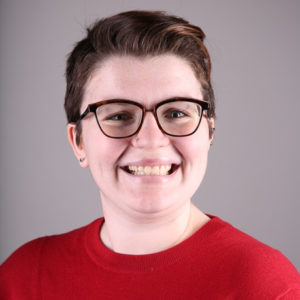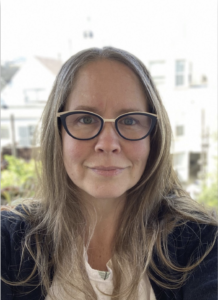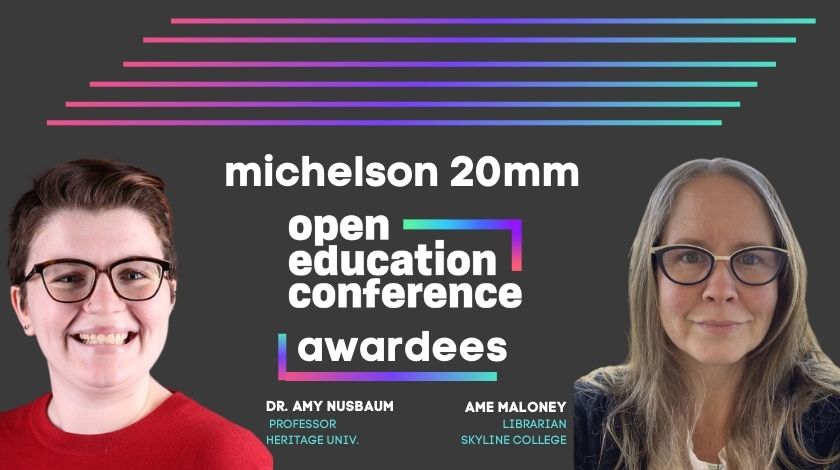During the recent Open Education Conference, the Michelson 20MM Foundation and the awardees of our attendance scholarship program had the opportunity to hear from experts from around the world and meet others implementing open educational resources across the educational sphere. Over the next several weeks, we will share reflections from our scholarship recipients on their experiences at this year’s OpenEd Conference. Today, we are featuring Dr. Amy Nusbaum and Ame Maloney as they reflect on the role students play in developing and sustaining OER.
OER: Learning Materials Developed by and for Our Students
 When I think of the Open Education Conference, I think of home, support, and of joy. OpenEd is one of the first places I felt like my passion for students was not only recognized but also honored. It is the place where I met colleagues who became friends–the place my heart lives. When I heard of the opportunity to return, even virtually, I knew I had to do it, and I was overjoyed to be among my people once again.
When I think of the Open Education Conference, I think of home, support, and of joy. OpenEd is one of the first places I felt like my passion for students was not only recognized but also honored. It is the place where I met colleagues who became friends–the place my heart lives. When I heard of the opportunity to return, even virtually, I knew I had to do it, and I was overjoyed to be among my people once again.
Within the Open Educational Resources (OER) community, I am constantly struck by how committed people are to changing the status quo. In most situations that means changing textbooks to ensure that students are no longer burdened by exorbitant costs. To put it simply, every class that converts to open translates to a student who can afford food they otherwise would have skipped. The less-discussed change, however, is using the power of open-licensing to improve the content of the learning materials we use in our classes. Specifically, the power of open licenses means we not only can work to make our learning materials monetarily accessible for students, but also we can make them representative of the students who are sitting in our classes.
There were so many excellent examples of this idea at OpenEd. One of my favorite talks was “We Belong in STEM: Student-Created Scientist Spotlights in Introductory Astronomy” by Andrea Goering (@xtraplanetary on Twitter!). It is hard for students to imagine themselves in careers when they cannot see someone like them already in that career; in other words, “We can’t be it if we can’t see it.” This project aimed to tackle the issue by having students create profiles of astronomers on the site scientistspotlights.org to increase the odds that a student would find an astronomer they could relate to and possibly be inspired by. Another favorite was “Developing Small Business Case Studies to Serve a Minority-Serving College, Its Community and Beyond” from Lerski and Nunez Torres. I love the idea of students using their communities for open projects and integrating the communities in the learning materials that future students will use.
The power of open education is functionally limitless. As the community evolves, I cannot wait to see how we continue to evolve from “free textbooks” to “learning materials that were developed by and for our students.” It’s hard to understate the importance of the Open Education Conference in my career trajectory. I owe a whole lot to this community, and I am so thankful to be able to both be a part and, hopefully, give back. Thanks to Michelson 20MM for allowing me to participate this year!
Dr. Amy Nusbaum is an Assistant Professor of Psychology at Heritage University in Washington.
OER Allies: Partnership with Students is Essential to OER Sustainability
 Students not only benefit from the use of OER and implementation of Open Education Practices (OEP), but also they are our allies and partners in the work to make OER more inclusive, accessible, and sustainable. Students are the most powerful information source we have to shed light on the impact OER and OEP can have on students as well as how we might promote and sustain student-centric practices–together.
Students not only benefit from the use of OER and implementation of Open Education Practices (OEP), but also they are our allies and partners in the work to make OER more inclusive, accessible, and sustainable. Students are the most powerful information source we have to shed light on the impact OER and OEP can have on students as well as how we might promote and sustain student-centric practices–together.
During the OpenEd Conference, the Students at the Center international student plenary was a deep-dive into global practices of student OER leadership and advocacy, as well the benefits and challenges that OER and OEP have presented to the panel participants. Some experiential highlights included student leaders translating OER to multiple regial African languages; student institutional leaders sounding the rallying cry for OER across Eastern European higher education institutions; and normalizing “Free” textbooks as valuable academic resources (i.e., “not a scam”).
My takeaway from this rich student panel conversation is the potential for deep and meaningful partnership with student OER allies and advocates that exists at every higher education institution. I left this session inspired, ready to take on numerous specific calls to action for ways I can engage student allies even more comprehensively at my institution. These include
- Welcoming students to the OER conversation and starting to connect with interested students at student government;
- Making space for OER newcomers;
- Inviting student representatives to local discussions, as well as OER colloquiums and conferences;
- Engaging students in a variety of OER activities, including their interests and areas of study; co-creating OER with students; and/or financially funding student OER work through grants;
- Empowering students in mentorship opportunities;
- Prioritizing campus partnerships with student support allies including faculty, learning communities, libraries, and other OER advocates.
Students are OER and OEP’s most informed networkers, reporters, and advocates; they are integral allies to the sustainability and growth of Open Educational Practices and Resources. Let’s invite them in!
Recommended Resources
- Students at the Center (mentioned above: video 1 hour, 11 min, 51 sec)
- Congratulations! You’re Officially a Publisher. Now What? The Best 17-Minutes Getting Started Guide on OER Publishing Ever! (video: 16 min, 59 sec, slides)
In their short video, Salt Lake Community College facilitators Jen Hughes and Andrea Scott guide unsuspecting OER advocates in a step-by-step process of establishing and sustaining an OER publishing model that supports faculty adaptation and authoring of OER.
How many of us now engaged as faculty remixers and adapters and/or authors of OER content envisioned ourselves as publishers of academic content beyond the bounds of our classroom? If you, like me, have found yourself as the point person at your institution for navigating the world of OER publishing you’ll find Andrea Scott’s and Jen Hughes’ Congratulations! You’re Officially a Publisher. Now What? an invaluable return on investment for 17-minutes of your time.
Jen and Adrea lead us through their journey to a sustainable OER publishing process in a step-by-step getting started how-to:
- Select the primary publication platform your institution will utilize; in SLCC’s instance it is PressbooksEDU. There are other platforms out there including Rebus and LibreTexts.
- Offer Professional Development facilitated by publishing platform experts and in-house leads. Encourage discipline collaboration and include stakeholders.
- Identify your village of OER support for the publishing, curation, and review process. Librarians, Instructional Designers, and discipline colleagues are natural partners in the curation and peer-review process of OER adaptation and authoring. They can provide Copyright, Licensing, layout, and copy editing feedback.
Jen and Andrea don’t leave us with just a list of things to do, they share a workflow map, consultation request form, checklist, best practices, and tips for collecting data as well as a look forward to sustainability planning. If you are a nascent OER publisher or just want to learn more. this video is a must add to your viewing queue!
Ame Maloney is a Faculty Services Librarian at Skyline College in San Bruno, California.
Michelson 20MM is a private, nonprofit foundation seeking to accelerate progress towards a more just world through grantmaking, operating programs, and impact investing. Co-chaired and funded by Alya and Gary Michelson, Michelson 20MM is part of the Michelson Philanthropies network of foundations.
To sign up for our newsletter, click here.

